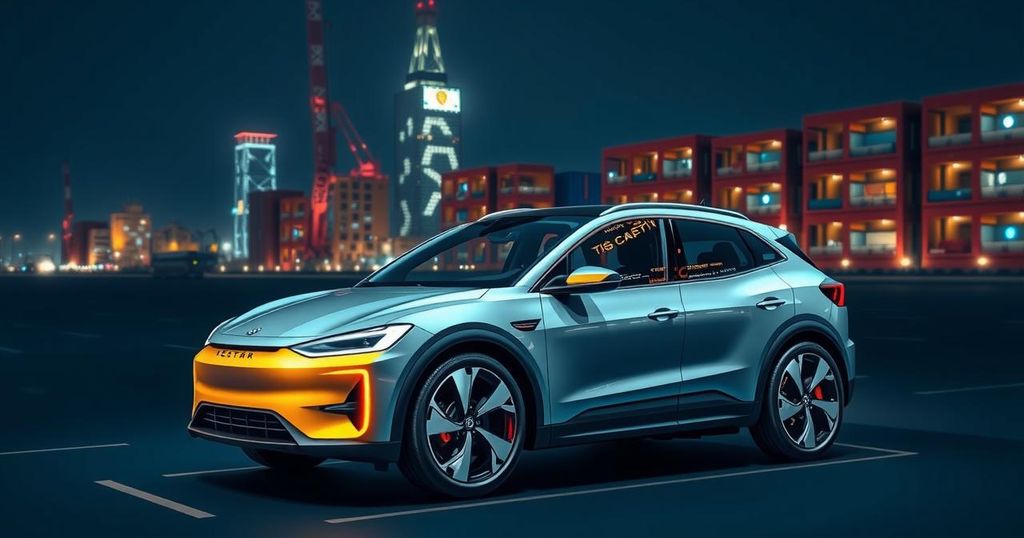Europe has imposed new tariffs on Chinese-made electric vehicles, with rates as high as 45%, prompted by concerns over subsidies from Beijing that have fueled Chinese competition. These tariffs aim to protect European automakers and maintain their economic stability amid rising threats from rapidly growing Chinese manufacturers. The move, however, has sparked fears of a trade war, as Chinese officials call the tariffs unfair and consider retaliatory actions.
In a bold move that reverberates through the automotive landscapes of Europe and China, European leaders have implemented steep tariffs on electric vehicles manufactured in China, reaching as high as 45 percent. This decision is a protective shield for Europe’s automotive sector, aimed at leveling the playing field that has dramatically tilted towards Chinese manufacturers due to significant subsidies from Beijing. As these tariffs take effect, European consumers are bracing for higher prices on electric vehicles, which were once more affordable owing to the competitive pricing strategies of Chinese automakers. This measure follows a comprehensive investigation by the European Union into the financial support extended by the Chinese government to its carmakers, which allowed them to accelerate the production and sale of electric vehicles. In the past three years, the market share of these vehicles in the EU has skyrocketed to over 20 percent from a mere 3, underscoring the urgency felt by European manufacturers to protect their territory. While the tariffs add another layer to the existing 10 percent import duties, the varying rates—from 7.8 percent for Tesla to 35.3 percent for SAIC Motor—are calculated based on the subsidies accrued. This protective barrier comes against a backdrop of a significantly challenged European automotive sector, where traditional manufacturers were slow to adapt to the electric vehicle revolution, focusing instead on enhancing diesel engine efficiency until the diesel emissions scandal in 2015 forced a shift. Despite these efforts to secure the market, not all stakeholders are in agreement. Major German automakers like Volkswagen and Stellantis, which have substantial investments in China, argue that these tariffs could provoke retaliatory actions from Beijing, jeopardizing their access to one of the world’s largest automotive markets. “Under a tariffs regime, an industry only loses time,” Volkswagen’s financial chief, Arno Antlitz, commented, voicing concerns over competition. In the face of these tariffs, the Chinese auto industry is considering its own responses, potentially imposing tariffs on European gasoline-powered vehicles as a means of retaliation. The unfolding scenario paints a picture of escalating tensions as both sides dig in their heels while professing the need for premium prices and fair competition. As negotiations linger and significant gaps remain between the two powerhouses, the path forward is fraught with uncertainty—but the spirit of innovation and market dynamics will never waver.
The escalating tension between Europe and China in the automotive sector is underscored by the introduction of higher tariffs on electric vehicles from China. With Europe seeking to protect its automotive industry, the backdrop includes a surge in competition from Chinese manufacturers, facilitated by substantial subsidies that have enabled them to dominate the market. The significance of the automotive sector, employing millions and contributing substantially to the EU’s economy, makes it a critical area of focus for policymakers amid this trade dispute. Indeed, this clash represents broader themes of globalization, competition, and the quest for economic sovereignty amidst changing market dynamics.
The implementation of higher tariffs on Chinese-made electric vehicles marks a significant moment in the ongoing conflict between Europe and China over trade practices and automotive market dominance. As European leaders strive to protect local industries from aggressive pricing strategies backed by substantial subsidies from Beijing, the response from Chinese automakers and the potential for retaliation creates a complex web of economic relations. The outcome of this tariff conflict could redefine market landscapes and influence future investments across the two continents, leaving consumers and automakers alike to adapt to a new reality.
Original Source: www.nytimes.com

Leave a Reply